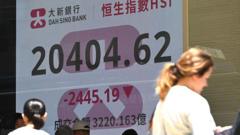"Asian stock markets experienced their worst decline in decades due to the new tariffs introduced by U.S. President Donald Trump. Major indices from Shanghai to Tokyo reported sharp decreases, igniting fears of a global trade war and potential recession."
"Asian Markets Plunge Amid Trump Tariff Announcement, Sparking Trade War Fears"

"Asian Markets Plunge Amid Trump Tariff Announcement, Sparking Trade War Fears"
"Tariffs imposed by U.S. President Donald Trump lead to significant declines in Asian stock markets, raising concerns about a potential global recession."
Asian stocks plummeted on Monday, experiencing declines not seen in decades, following the recent tariff announcements by U.S. President Donald Trump. The impacts were particularly severe on Asian economies already sensitive to fears of a possible global trade conflict that could stall economic growth, especially in the United States.
The Shanghai Composite index faced significant setbacks, plunging over 8% at one stage, while Hong Kong's Hang Seng index suffered a dramatic drop of more than 13%. Japan's Nikkei 225 also recorded a notable decline, closing down 7.8% in what analysts described as a "bloodbath." This turmoil in Asian markets reflects the ongoing turmoil in global stock exchanges, which reacted sharply after Trump declared new import taxes ranging from 10% to 46% on several countries, thereby exacerbating fears about trade relations.
European markets echoed this trend, beginning the trading day with substantial losses, particularly in banking and defense sectors. The tariffs represent a significant blow to Asian manufacturing centers that rely heavily on the U.S. as an essential export market. Nations such as Japan and South Korea, alongside developing economies like Vietnam, are set to feel the negative effects, with Vietnam particularly facing the highest proposed tariffs at 46%. Other nations like Cambodia, Thailand, and China will see steep rates as well, with total tariffs reaching a staggering 54% for China.
Investment experts warn that these tariff arrangements are unlikely to be short-lived. Qian Wang, the Asia Pacific chief economist at Vanguard, reflected that while there may be potential for negotiations, the reality of heightened tariff measures is probably here to stay.
Moreover, the interaction of tariffs with inflation expectations and recession fears is already influencing economic forecasts. Goldman Sachs raised the possibility of a U.S. recession occurring within the next 12 months to 45%, while JPMorgan has put the chances at 60%. The dependence of Asian economies on the U.S. market for exports amplifies the risks presented by any trade disputes.
Despite the evolving dynamics, some experts maintain hope amid the uncertainty. Frank Lavin, former undersecretary for international trade at the U.S. Department of Commerce, emphasized that Asia's exposure to U.S. markets puts it at the frontline of the economic fallout. China's retaliatory tariffs have compounded the volatility in stock markets, as the interlinking of global economies means that a downturn in one region can quickly propagate throughout others.
The significant declines observed in U.S. and European markets—such as a near 6% drop in the S&P 500 and a 5% decline in the UK's FTSE 100—indicate that this economic turbulence could be far-reaching. Analysts caution that the downward trends may persist, with U.S. premarket trading already indicating further challenges ahead for Wall Street. Overall, these developments underscore the profound ramifications of Trump's tariff policies on the worldwide economy, particularly for the Asian markets particularly integral to global trade networks.




















